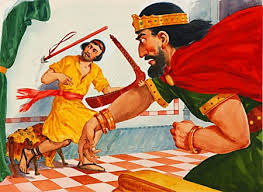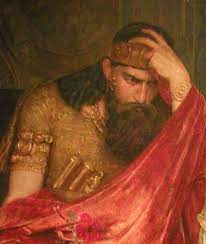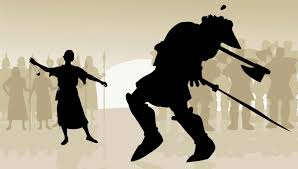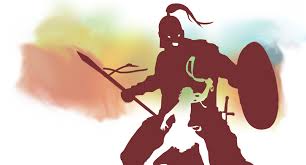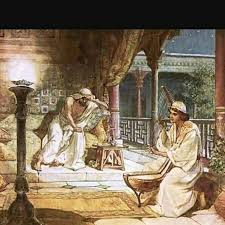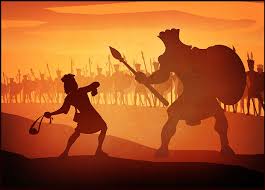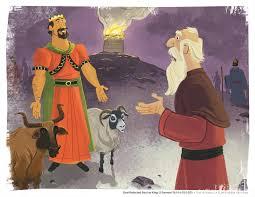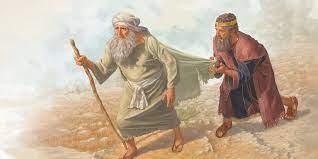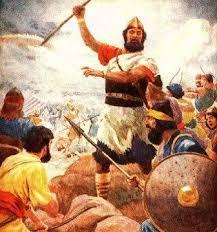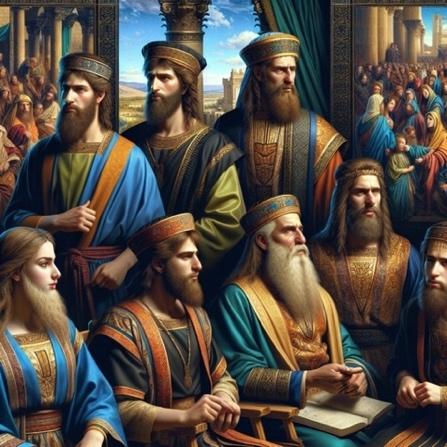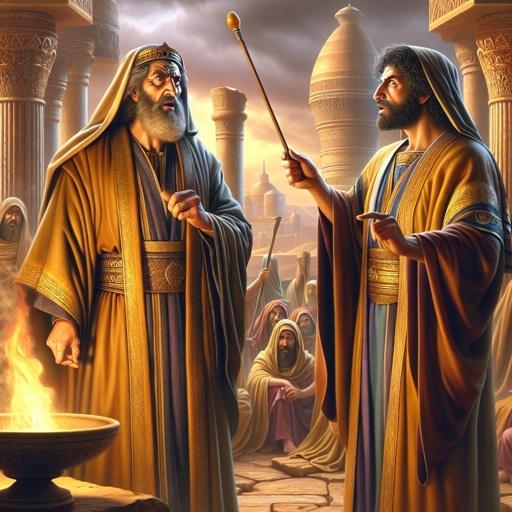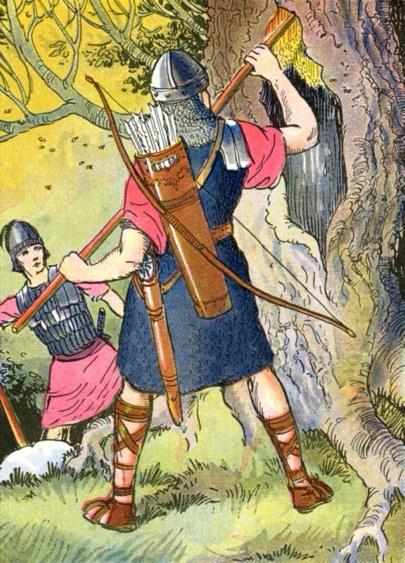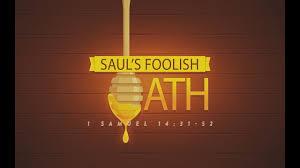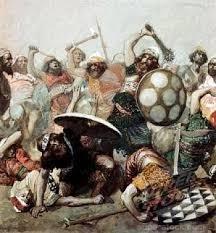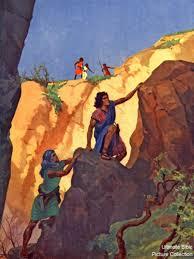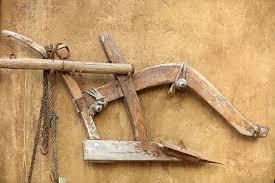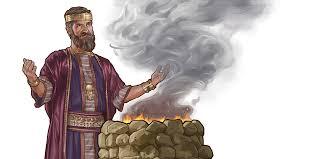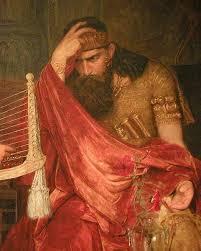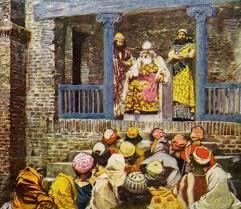Ct – Sha’ul Tries to Kill David First Samuel 19: 1-24
Sha’ul Tries to Kill David
First Samuel 19: 1-24
Sha’ul tries to kill David DIG: Why is Sha’ul so eager to kill David? How did David respond to Sha’ul’s hatred of him? What did that say about David? How is Sha’ul fighting God’s will? Why would a person knowingly do this? Why do you think Jonathan seems more loyal to David than to his own father? Why did David seem to trust Sha’ul’s vow at this point? Why did YHVH send an evil spirit to Sha’ul again? What is the LORD trying to do? Why did David play the lyre again, after all he and Sha’ul had been through? Like Jonathan, does it surprise you that Michal, David’s wife, was more loyal to him than to her father? The prophesying here was probably singing and praising ADONAI. Why did this seem to keep Sha’ul’s men from capturing David? Why is it ironic that Sha’ul ends up prophesying also?
REFLECT: Has someone ever hated you for no good reason? How did you react? How has your loyalty to friends been tested recently? Did you pass the loyalty test? How so? Is there any situation in your life right now in which you feel like “the enemy is closing in?” Have you devised a plan of escape? Do you have any less than loyal plans that ADONAI might be frustrating? What would it take for you to submit to the Lord’s stronger and wiser will? How can praise and worship help you in your times of trouble?
Knowing the evil intentions of his heart,
God treated Sha’ul like Pharaoh and hardened his heart.
Sha’ul – ever fearful and threatened, as well as aware that his dynasty was cursed and his kingdom would not last – soon grew suspicious of the young champion, saw him as his rival, and sought to murder him. Under this deadly threat, David would seemingly have had no chance. But he had an ally in the court, his friend Jonathan. Their lives had been knit together in such a way that they made a covenant of loyalty to each other even though David, who was in his early twenties at the time, was half Jonathan’s age (18:3).368
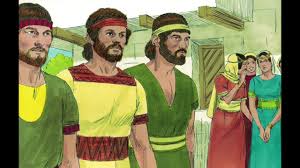
Sha’ul Tries to Kill David by His Servants: Sha’ul was tired of behind-the-scenes plots and was out to destroy his son-in-law in the quickest way possible, so he told his son Jonathan and all his servants to kill David. Apparently Sha’ul was not aware of the deep friendship between his son and David. When this happened the prince warned David of his father’s intention. But Jonathan was very fond of David, and told him, “My father Sha’ul is out to have you killed. Therefore you must be very cautious tomorrow morning. Find a well-concealed place to hide in. The conspiracy was well planned. I will go out and stand next to my father in the countryside where you’re hiding. I will talk with my father about you; and if I learn anything, I’ll tell you” (19:13 CJB).
Jonathan even interceded with his father and spoke well of David, “Let not the king do wrong to his servant David; he has not wronged you, and what he has done has benefited you greatly. He took his life in his hands when he killed the Philistine. YHVH won a great victory for all Isra’el, and you saw it and were glad. Why then would you do wrong to an innocent man like David by killing him for no reason? Sha’ul, enjoying a sane moment, listened to Jonathan and took this oath, “As surely as ADONAI lives, David will not be put to death.” So Jonathan called David and told him the whole conversation. He brought him to Sha’ul, and David was with Sha’ul as before (19:4-7). It’s remarkable that such a magnificent son could belong to such a wicked father! Had Jonathan been selfish, he could have helped to eliminate David and secure the crown for himself, but he submitted to ADONAI and assisted David.369
Sha’ul Tries to Kill David by the Spear Again: After an initial and successful attempt by Jonathan to smooth his father’s feelings toward David, Sha’ul continued his jealous attack against Isra’el’s future king. Once more war broke out, and David again went out and fought the Philistines and again he was extremely successful. He struck them with such force that they fled before him. Sha’ul was elected king to free the nation from the Philistines, but David was more successful than Sha’ul ever thought of being. Therefore, all of Jonathan’s efforts left Sha’ul unmoved and murderous in his resolve. So YHVH treated Sha’ul like Pharaoh and hardened his heart, and knowing the evil intentions of his heart, gave him over to an evil spirit as he was sitting in his house with his spear (scepter) in his hand. The Adversary is a liar and murderer (John 8:44), and because the Evil One controlled Sha’ul, he tried to pin David to the wall with his spear while he was playing the lyre. But David eluded him as Sha’ul drove the spear into the wall. That night David made good his escape (19:8-10). David was then a hunted man, sought by the king. Thus far in the narrative David is completely passive. He took no initiative, nor are we told of his responses to Sha’ul. The story simply gives room for the venom of Sha’ul to have its full, self-destructive play.370
Sha’ul Tries to Kill David by the His Messengers: Sha’ul can now think of nothing except the threat of David. So he sent men to David’s house to watch it and to kill him in the morning. But Michal, David’s wife, knowing her father’s thought processes, warned him, “If you don’t run for your life tonight, tomorrow you’ll be killed.” So Michal let David down through a window (evidently an unguarded position with the messengers watching only the doors), and he fled and escaped. While Michal was scheming, David was praying (to see link click Cu – Sha’ul Sent Men to Kill David). Then Michal took one of her own idols (the house of Sha’ul was not totally free of idolatry) and laid it on the bed, covering it with a garment and putting some goat’s hair at the head. Apparently the men went back to Sha’ul and told him that David never came out. But when Sha’ul sent the men back a second time to capture David, Michal said, “He is ill.” They did not enter the house to check out Michal’s story so Sha’ul sent the men back a third time to see David and told them, “Bring him up to me in his bed so I may kill him.” But when the men entered, they discovered what the reader already knows: David was not there. There was the idol in the bed, and at the head was some goat’s hair. Only then does the father speak to his daughter. Only then do we hear the anguish in Sha’ul’s voice: Why did you deceive me like this and send my enemy away so he escaped?” Sha’ul’s sadness, however, wasn’t enough to compel Michal’s honest respect. She told him, “He said to me, ‘Let me get away. Why should I kill you’ (19:11-17)?”
We seem to be watching a soap opera. There is nothing here about ADONAI, ADONAI’s will, or ADONAI’s Kingdom. We are watching calculating humans that do not measure up to our expectations. Michal despised David in her heart so she chose to do wrong out of a selfish heart- just like her father. The hardened and selfish heart attitude of Sha’ul had infected the whole scene. David had escaped and Sha’ul was left with his evil spirit and without the object of his intense hatred. As a result of his obsession to kill David, Sha’ul had lost a son, and then a daughter.371
David Flees to Ramah: When David had fled and made his escape, he went to Samuel at his home in Ramah and told him all that Sha’ul had done to him. This was a logical place because it was Samuel who anointed David as the next king in place of Sha’ul. Then he and Samuel went to Naioth, a section of Ramah containing the school of the prophets, which would provide a measure of sanctuary, and stayed there.
But Sha’ul’s spies were everywhere, and they reported to the king where he could find David. Word came to Sha’ul, “David is in Naioth at Ramah,” so he sent men to capture him. But when they saw a group of prophets prophesying, with Samuel standing there as their leader, the Ruach Ha’Kodesh came upon Sha’ul’s men, and they also prophesied. Keep in mind, this is not a blessing – but a judgment. They fell into a trance-like state that made it impossible for them to harm David. Sha’ul was told about it, and he sent more men a third time, and they also prophesied. Finally, in sheer exasperation, Sha’ul tried to take matters into his own hands by going to Ramah and went to the great cistern at Seku.
And he asked, “Where are Samuel and David?” David’s presence in Ramah was no secret because the people knew where they were. “Over in Naioth at Ramah,” they said. So Sha’ul went to Naioth at Ramah. But the Ruach Ha’Kodesh came even on him, which was a judgment because it made it impossible for Sha’ul to carry out his wicked plan. And he walked along prophesying until he came to Naioth. He stripped off his garments and he too prophesied in Samuel’s presence. This would be their last meeting until that fateful night when Samuel came up from Sh’ol to pass judgment on the king (See Dj – Sha’ul and the Medium at Endor). Sha’ul lay naked (a person was called naked whose outer clothes were thrown aside, leaving nothing but a long tunic next to the skin) in judgment all that day and all that night. And this gave David ample time to escape (19:18-24a). This pitifully embarrassing scene is that of this once great man, still tall but no longer great, prostrate on the ground, clearly not in control, shamed, now rendered pitiful and powerless.
But this wasn’t the first time he had prophecied. When Samuel anointed Sha’ul as the first king of Isra’el, he predicted that Sha’ul would prophecy, saying: The Spirit of ADONAI will fall on you, and you will prohesy . . . and be turned into a different man (10:6)! This came true on the same day. When they arrived at the hill, and there in front of him was a group of prophets, the Spirit of God fell on Sha’ul and he prophesied along with them. When those who knew him from before saw him there, prophesying with the prophets, they asked each other, “What’s happened to Kish’s son? Is Sha’ul a prophet, too?” (10:10-11). This is why people ask, “Is Sha’ul also among the prophets” (19:24b)?
These two events, one in Chapter 10 and one in Chapter 19, prove that a person can have a remarkable religious experience and yet have no change of heart. In Sha’ul’s case, both experiences were actually sent by Ha’Shem, but Sha’ul didn’t profit from either one. Judas preached sermons and even performed miracles (Matthew 10:1-8), yet was not a believer. He ended up betraying the Lord and taking his own life (see the commentary on The Life of Christ Lm – Judas Hangs Himself). Sha’ul, like Judas, had many opportunities to see God’s hand at work, and yet he never had a life-changing experience.372
Even though the people asked: Is Sha’ul also among the prophets? – this question, however, can be asked in two very different tones of voice. In the first instance the question can be asked with expectancy, suggesting this surprising king, then powerfully energized by the Ruach HaKodesh, would rule in obedience to YHVH. But all that is left in the end is an empty shell of hate, no longer a king. Sha’ul’s career will be winding down for a while, but the narrator wants us to see that his rule is, in fact, finished.373
While Sha’ul was occupied at the school of the prophets, David slipped away from Ramah and went to meet Jonathan somewhere near Gibeah. David and Jonathan would make one final attempt to reconcile with the king, and it would almost cost Jonathan his life. Sha’ul was double-minded and unstable in all his ways (James 1:8). He would try to rule Judah and defeat the Philistines while also chasing David all over the landscape trying to kill him. The longer David eluded him, the more fanatical Sha’ul became until he finally ended his own life on the battlefield (see Dk – Sha’ul Take His Own Life), rejecting the help of the One who could have given him victory.374
Dear heavenly Father, praise You that You hold my life in Your hands. When King Sha’ul tried to kill David, Your hand of protection was upon David and so in no way would Sha’ul ever be able to do what was against Your will. How wonderful that those who have faith in You have no fear of death, but wait in eager expectation of a glorious life with You in Your marvelous heaven. They shall be His people, and God Himself shall be among them and be their God. He shall wipe away every tear from their eyes, and death shall be no more. Nor shall there be mourning or crying or pain any longer, for the former things have passed away (Revelation 21:3b-4). When the time has come that You have decided to take me home with You. Nothing can separate me from You. For I am convinced that neither death nor life, nor angels nor principalities, nor things present nor things to come, nor powers, nor height nor depth, nor any other created thing will be able to separate us from the love of God that is in Messiah Yeshua our Lord (Romans 8:38-39). Thank You for the great future joy of living with you eternally! In Messiah Yeshua’s holy Name and power of His Resurrection. Amen



